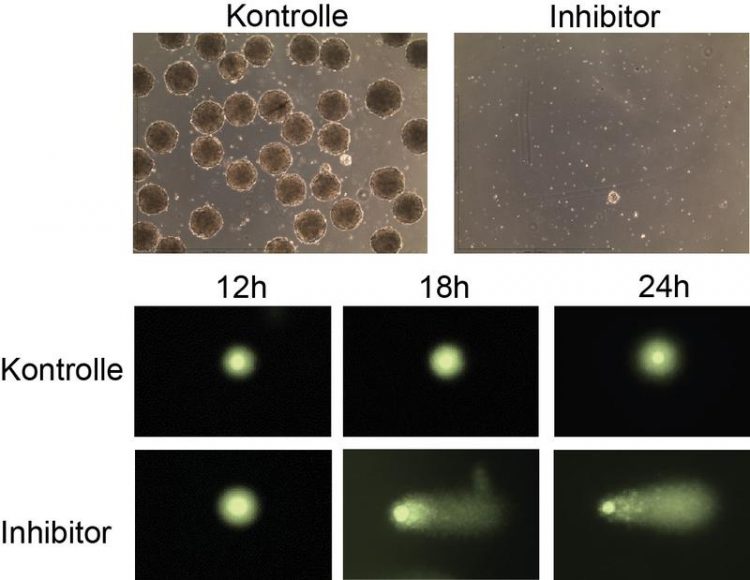Cancer research: Enzyme inhibition with a surprise

Inhibition of KDM6 enzymes causes embryo-like cell structures to die. A comet assay shows that inhibition causes accumulated DNA damages: The bigger the "tail" around a cell, the greater the damage. (Picture: Matthias Becker)
Matthias Becker and Professor Albrecht Müller, two molecular biologists from the Julius-Maximilians-Universität Würzburg (JMU) in Germany, are interested in the group of so-called KDM6 enzymes. These enzymes are very frequently mutated in bladder cancer, leukaemia and other cancer types so that they no longer function correctly.
How exactly the mutations work inside the cancer cells is still unknown. But the Würzburg scientists have found first hints: The mutations seem to contribute to accumulating DNA damages.
All KDM6 enzymes inhibited
This finding has been made in experiments conducted by Christine Hofstetter, Becker's former doctoral student. The biologist inhibited the activity of all KDM6 enzymes in embryonic stem cells of mice and in embryo-like structures. The latter are spherical structures consisting of several hundred cells that cannot develop into an organism.
The embryo-like structures died as a result of enzyme inhibition. The JMU researchers detected massive accumulations of DNA damages in their cells. Surprisingly, these effects did not occur in the embryonic stem cells: Neither the gene activity nor the cells' ability to survive changed.
“We conclude from our results that there is a fundamental difference when treating DNA damages in stem cells and in the differentiated cells evolving from them,” Becker says. The molecular biologists now intend to study this difference in more detail.
Published in the Journal of Cell Science
The detailed findings have been published in the Journal of Cell Science: Inhibition of KDM6 activity during murine ES cell differentiation induces DNA damage, Christine Hofstetter, Justyna M. Kampka, Sascha Huppertz, Heike Weber, Andreas Schlosser, Albrecht M. Müller, Matthias Becker, Journal of Cell Science 2016, DOI 10.1242/jcs.175174
The work was conducted within the scope of focal programme 1463 “Epigenetic Regulation of normal hematopoiesis and its dysregulation in myeloid neoplasia” funded by the German Research Foundation (Deutsche Forschungsgemeinschaft, DFG).
Facts about KDM6 enzymes
The investigated KDM6 enzymes are lysine-specific demetyhlases 6. In “normal mode”, they remove methylations at the amino acid lysine 27 of histone H3, causing genes to be activated. Histones are proteins that package and order the DNA inside the cell nucleus. Moreover, they influence gene activity in the individual sections of the DNA.
Contact
Dr. Matthias Becker, Institut für Medizinische Strahlenkunde und Zellforschung, Julius-Maximilians-Universität Würzburg (JMU), Bavaria, Germany, Phone +49 931 201-45851, matthias.becker@uni-wuerzburg.de
Media Contact
More Information:
http://www.uni-wuerzburg.deAll latest news from the category: Life Sciences and Chemistry
Articles and reports from the Life Sciences and chemistry area deal with applied and basic research into modern biology, chemistry and human medicine.
Valuable information can be found on a range of life sciences fields including bacteriology, biochemistry, bionics, bioinformatics, biophysics, biotechnology, genetics, geobotany, human biology, marine biology, microbiology, molecular biology, cellular biology, zoology, bioinorganic chemistry, microchemistry and environmental chemistry.
Newest articles

Compact LCOS Microdisplay with Fast CMOS Backplane
…for High-Speed Light Modulation. Researchers from the Fraunhofer Institute for Photonic Microsystems IPMS, in collaboration with HOLOEYE Photonics AG, have developed a compact LCOS microdisplay with high refresh rates that…

New perspectives for material detection
CRC MARIE enters third funding period: A major success for terahertz research: Scientists at the University of Duisburg-Essen and the Ruhr University Bochum have been researching mobile material detection since…

CD Laboratory at TU Graz Researches New Semiconductor Materials
Using energy- and resource-saving methods, a research team at the Institute of Inorganic Chemistry at TU Graz aims to produce high-quality doped silicon layers for the electronics and solar industries….



